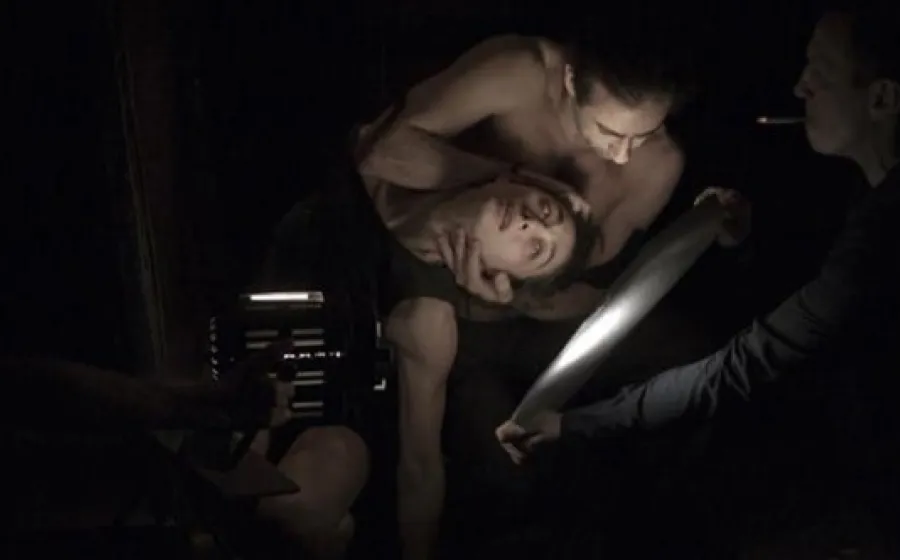ARMINE, SISTER
Date
Location
Price
Institution
The project was developed by means of expeditions and research into Armenian history and tradition, and one of its key concepts is to tackle the question of taboo and the hypocrisy of history contrasted against the duty to give testimony.
Giving an account of the post-Auschwitz future that Adorno predicted for poetry, art and education, Teatr ZAR reflects on the possibility that the 21st century won’t become the century of ignorance and poses questions about Europe as a matter of history, identity and dignity. “When we travelled around Anatolia we visited the ruins of a church that had been destroyed, where at one time the songs performed in Armine, Sister rang out. We touched the dust on the floor, afraid to wonder if we had a right to disturb its peace, and we understood that what we didn’t have was the right to remain silent. Our musical undertaking accepts a violation of silence and peace with the aim of listening, once more, to the voice of the past. This voice won’t tell us a particular story, nor will it be laden with trauma. Quite the reverse; it will be vital and full of the sound, dignity and identity of the departed, whose names nobody has uttered since. Was it enough to speak of them with numbers, locations and dates, or would it perhaps have been better to allow them to remain in silence? Art allows us to evoke this silence so that it can be heard once more”, explains Fret. The project includes musicians from various traditions of Asia Minor, Anatolia and Iran, who were encountered during the expeditions. Through their atavistic songs the painful process of memory, which is a constant in Armine, Sister, fascinates, calms, hooks and traumatises like an assault on the emotions. Giving meaning to it will be the only way to remain composed. About Teatr Zar
Teatr ZAR was formed at the Jerzy Grotowski Institute (Poland) over the course of research expeditions to Georgia between 1999 and 2003. On these trips they compiled a large amount of musical material, and in their opinion they may have found the oldest polyphonic compositions in the world. “Zar” is the name of the funeral songs sung by the Svans, a people of the highlands of the Caucasus region in northeast Georgia). Teatr ZAR aims to prove that theatre should not only be seen but that –above all– it needs to be heard.
Its performances are part of a long process of research, travel, personal exploration and transformation. Once again, they bring us theatre as it used to be, before the art splintered into different disciplines and styles, tackling songs that in our era seem to be reserved solely for religion, drawing on the Polish Romantic belief that the aim of this art form is not just to complement the religious movement but also to be able to fill the dynamic void between daily life and transcendence. Juliusz Osterwa, one of the few who tried to put these ideas into practice and whose thinking inspired J. Grotowski, said: “God created theatre for those for whom the Church wasn’t enough”.
Teatr ZAR’s first big hit was its Gospel of Childhood trilogy. Produced between 2003 and 2009, it was the culmination of research spanning over ten years and of the evolution of the company itself. It premiered in the Barbican Centre in London and toured cities like Los Angeles, San Francisco, Florence, etc. It was named Best New Music Theatre by the Los Angeles Times and was performed at the Edinburgh Fringe Festival in 2012, where it won the Total Theatre Award in the physical theatre category as well as the Herald Angel Award. In 2011 the group began to focus on the project Armine, Sister, dedicated to the history and culture of the Armenian nation which occupies Anatolia and the extermination of Armenians carried out in the early 20th century. The project was developed via expeditions and research into Armenian history and tradition, and one of its key concepts is to tackle the question of taboo and the hypocrisy of history contrasted against the duty to give testimony.
Photo (c) Irena Lipinska
Credits
On Stage: Davit Baroyan, Ditte Berkeley, Przemysław Błaszczak, Alessandro Curti, Jarosław Fret, Murat İçlinalça, Dengbesz Kazo, Aram Kerovpyan, Vahan Kerovpyan, Kamila Klamut, Aleksandra Kotecka, Simona Sala, Orest Sharak, Mahsa Vahdat, Marjan Vahdat, Tomasz Wierzbowski.
Study of modal music: Aram Kerovpyan Vocal technique: Virginia Pattie Kerovpyan Lighting: Maciej Mądry Musical dramaturgy, installation and direction: Jarosław Fret Worldwide premiered in Wroclaw (Poland) 2013
Spanish premiere.
BUY TICKETS HERE
Artistic team and specifications
- Duracion
- 80 minutes.
- Idioma
- The show is based on traditional songs from Turkey, Armenia, Iran, Corsica and Sardinia.

